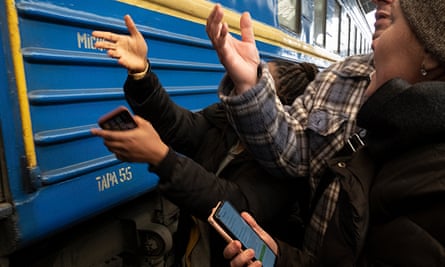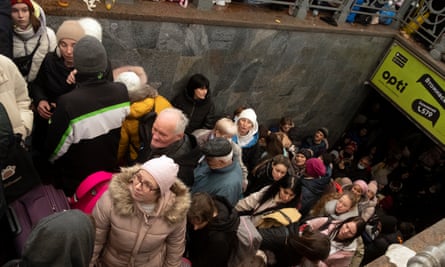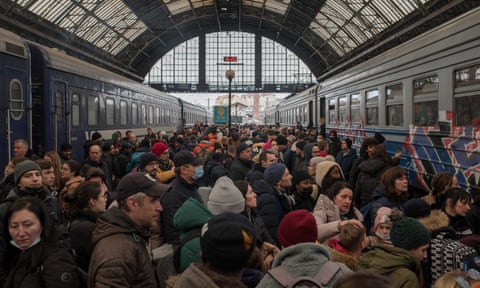At the ticket windows in the railway station in Lviv in western Ukraine, 60 kilometres from the Polish border, there are two kinds of tickets for the refugees wanting to flee the violence of the Russian invasion.
First, the free tickets for the evacuation trains. The catch is, these are almost impossible to get.
The alternative is a ticket for the regular service. The catch this time is that tickets are unavailable until well into March. And even then, men of military age are not allowed travel.

Standing on his own is 43-year-old Alexei Lutaev, a building site manager from Dnipro. He is waiting to get tickets for a train to Poland for his 16-year-old son, who is waiting in a car nearby with his wife.
“I can’t go myself because I am an able-bodied man and I’m not allowed to leave, Lutaev said. “My son is going to school in Poland anyway but we want to get him on the train. And my wife won’t leave if I can’t go. So we are staying. But I have faith that the Ukrainian army can defend us.”
Otherwise, he says, he would do anything to get across the border. “I was in Berdyansk [a town next to Mariupol on the Sea of Azov] when it started. I heard the Russian air strikes and I decided to go straight home to Dnipro to pick up my family.”
People in the crowded ticket hall are sitting wherever there was space. Some are sleeping on the floor. Most, however, are jostling at ticket windows where there are few tickets to be had.
In the queue is Tony Frazier from Tampa, Florida, who flew to Kyiv a week before the invasion to pick up his Ukrainian wife. He says he has seen a ticket available for 4 March.
“We knew something could happen,” he says. “It was horrible. When the explosions started in Kyiv, we rushed to the station. Everyone was fighting to get on a train, pushing women over to escape. We changed trains in Zhitomyr [to the west of Kyiv], where we had the same fight to get another train. It has been terrible but there isn’t any choice.”
He says the US embassy told him it could help them, but first they had to get across the border.

Crowds block the stairways to the platforms, where people are standing five deep.
As the last three passengers squeeze on to the train to Uzhgorod, south of Lviv near the Hungarian border; the conductor tells everyone else on the platform that the train is full. He is met with desperate appeals. The train pulls away to reveal bags and a broken pram lying by the tracks.
Waiting outside the station on Sunday is Yulia Anosova, 30, who works for a women’s rights organisation and escaped from Kyiv on an evacuation train with only her laptop, documents and a change of clothes.
“I’m trying to get to Poland,” she says. “I know people there who can put me up. I left on the 25th on an evacuation train from Kyiv but it was really overcrowded. I had to stand all the way for eight hours.”
Anosova lives on the outskirts of Kyiv near the Hostomel airbase, where there was heavy fighting late last week. “I stayed for 27 hours,” she says. “There were no sirens to warn what was about to happen, only the explosions happening. I went down to the shelter several times during the night then I decided I should leave.”
As she is speaking, a man walks through the crowd touting a car to go the border. Almost instantly a family with young children disappear with him.
The UN estimates that 368,000 people have already fled from Ukraine into neighbouring countries in recent days, and for many the train remains the most reliable escape route, not least to Przemyśl, the first station in Poland across the border. The scale of the movement of people, both inside Ukraine and over its borders, is already huge.
“Heartfelt thanks to the governments and people of countries keeping their borders open and welcoming refugees,” said Filippo Grandi, the head of the UN refugee agency as he warned that “many more” Ukrainians were moving toward the borders.
What is less clear is how many more are displaced internally. “Displacement in Ukraine is also growing, but the military situation makes it difficult to estimate numbers and provide aid,” he said.
While some have crossed to Hungary, the majority of those escaping have left for Poland, which is allowing anyone from Ukraine to enter, even those without valid passports. It estimates that it could host 1.5 million Ukrainians in a worst-case scenario.
The alternative to the train, for those with access to a car, is a queue of two days or more to leave via the Medyka border crossing. Failing that, people are required to walk five kilometres from a taxi drop-off point near the border, carrying luggage, children and even pets. It is a prospect that is too much for many.
The situation is particularly difficult for the many foreigners who had come to Ukraine to work and study. Desmond Alfred, a 23-year-old student from Nigeria, was studying medicine in Odessa. “Originally we were supposed to be taken by bus to Moldova,” he says. “But that got cancelled so we made our way here. The Nigerian embassy will help us when we cross, but until then I have no money.”
